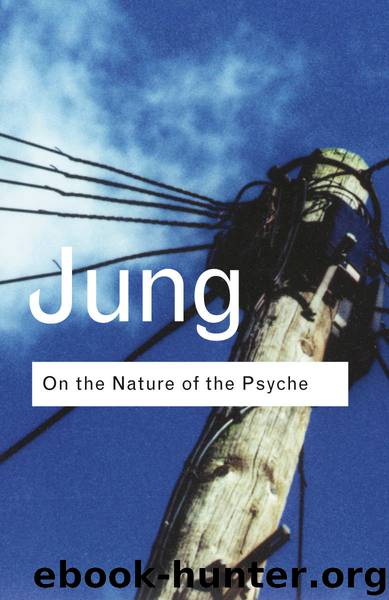On the Nature of the Psyche (Routledge Classics) by C.G. Jung

Author:C.G. Jung [Jung, C.G.]
Language: eng
Format: azw3
ISBN: 9781136848919
Publisher: Taylor and Francis
Published: 2014-12-18T05:00:00+00:00
4. INSTINCT AND WILL
371 Whereas, in the course of the nineteenth century, the main concern was to put the unconscious on a philosophical footing,36 towards the end of the century various attempts were made in different parts of Europe, more or less simultaneously and independently of one another, to understand the unconscious experimentally or empirically. The pioneers in this field were Pierre Janet37 in France and Sigmund Freud38 in the old Austria. Janet made himself famous for his investigation of the formal aspect, Freud for his researches into the content of psychogenic symptoms.
372 I am not in a position here to describe in detail the transformation of unconscious contents into conscious ones, so must content myself with hints. In the first place, the structure of psychogenic symptoms was successfully explained on the hypothesis of unconscious processes. Freud, starting from the symptomatology of the neuroses, also made out a plausible case for dreams as the mediators of unconscious contents. What he elicited as contents of the unconscious seemed, on the face of it, to consist of elements of a personal nature that were quite capable of consciousness and had therefore been conscious under other conditions. It seemed to him that they had “got repressed” on account of their morally incompatible nature. Hence, like forgotten contents, they had once been conscious and had become subliminal, and more or less irrecoverable, owing to a counter-effect exerted by the attitude of the conscious mind. By suitably concentrating the attention and letting oneself be guided by associations—that is, by the pointers still existing in consciousness—the associative recovery of lost contents went forward as in a mnemo-technical exercise. But whereas forgotten contents were irrecoverable because of their lowered threshold-value, repressed contents owed their relative irrecoverability to a check exercised by the conscious mind.
373 This initial discovery logically led to the interpretation of the unconscious as a phenomenon of repression which could be understood in personalistic terms. Its contents were lost elements that had once been conscious. Freud later acknowledged the continued existence of archaic vestiges in the form of primitive modes of functioning, though even these were explained personalistically. On this view the unconscious psyche appears as a subliminal appendix to the conscious mind.
374 The contents that Freud raised to consciousness are those which are the most easily recoverable because they have the capacity to become conscious and were originally conscious. The only thing they prove with respect to the unconscious psyche is that there is a psychic limbo somewhere beyond consciousness. Forgotten contents which are still recoverable prove the same. This would tell us next to nothing about the nature of the unconscious psyche did there not exist an undoubted link between these contents and the instinctual sphere. We think of the latter as physiological, as in the main a function of the glands. The modern theory of internal secretions and hormones lends the strongest support to this view. But the theory of human instincts finds itself in a rather delicate situation, because it is
Download
This site does not store any files on its server. We only index and link to content provided by other sites. Please contact the content providers to delete copyright contents if any and email us, we'll remove relevant links or contents immediately.
Rewire Your Anxious Brain by Catherine M. Pittman(18638)
Talking to Strangers by Malcolm Gladwell(13342)
The Art of Thinking Clearly by Rolf Dobelli(10444)
Mindhunter: Inside the FBI's Elite Serial Crime Unit by John E. Douglas & Mark Olshaker(9313)
Becoming Supernatural by Dr. Joe Dispenza(8196)
Change Your Questions, Change Your Life by Marilee Adams(7753)
Nudge - Improving Decisions about Health, Wealth, and Happiness by Thaler Sunstein(7689)
The Road Less Traveled by M. Scott Peck(7592)
The Lost Art of Listening by Michael P. Nichols(7487)
Mastermind: How to Think Like Sherlock Holmes by Maria Konnikova(7314)
Enlightenment Now: The Case for Reason, Science, Humanism, and Progress by Steven Pinker(7305)
Win Bigly by Scott Adams(7183)
The Way of Zen by Alan W. Watts(6594)
Daring Greatly by Brene Brown(6501)
Big Magic: Creative Living Beyond Fear by Elizabeth Gilbert(5753)
Grit by Angela Duckworth(5598)
Ego Is the Enemy by Ryan Holiday(5412)
Men In Love by Nancy Friday(5231)
The Laws of Human Nature by Robert Greene(5170)
